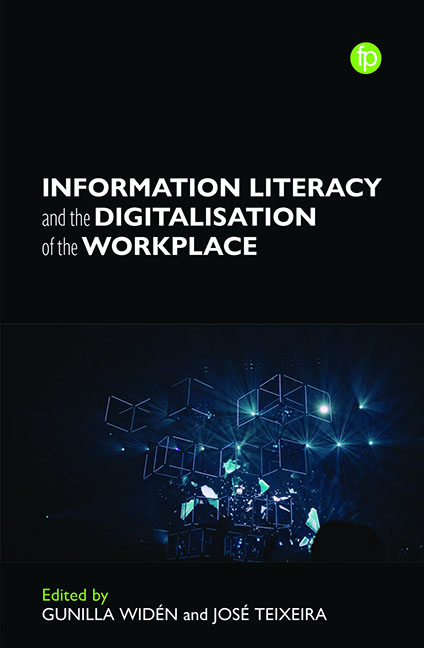Book contents
- Frontmatter
- Contents
- Figures and Tables
- Contributors
- Introduction: Advancing Theory on Workplace Information Literacy
- 1 Literature Review: In Search of the Many Meanings of Information Literacy
- 2 Digital Literacy in a Post-Digital Era: Rethinking ‘Literacy’ as Sociomaterial Practice
- 3 Methodological Choices of Information Literacy in the Workplace: Qualitative, Quantitative or Mixed-Methods?
- 4 Investigating Information Seeking and Information Sharing Using Digital Trace Data
- 5 Making Do With Limited Transparency of Sensitive Information in Secretive Organisations: Collective Information Literacy Through Hinting
- 6 Information Literacy Competencies for Career Transitions in the Digital Age
- 7 The Importance of Information Literacy for Work Satisfaction in a World-Wide-Workplace Context
- 8 Entrepreneurs’ Digital Information Sources Selection: A Perspective on the Impact of Information Literacy and Generational Differences
- 9 Conclusion: Workplace Information Literacy as the Literacy of the Digital Workplace
- Index
2 - Digital Literacy in a Post-Digital Era: Rethinking ‘Literacy’ as Sociomaterial Practice
Published online by Cambridge University Press: 17 December 2023
- Frontmatter
- Contents
- Figures and Tables
- Contributors
- Introduction: Advancing Theory on Workplace Information Literacy
- 1 Literature Review: In Search of the Many Meanings of Information Literacy
- 2 Digital Literacy in a Post-Digital Era: Rethinking ‘Literacy’ as Sociomaterial Practice
- 3 Methodological Choices of Information Literacy in the Workplace: Qualitative, Quantitative or Mixed-Methods?
- 4 Investigating Information Seeking and Information Sharing Using Digital Trace Data
- 5 Making Do With Limited Transparency of Sensitive Information in Secretive Organisations: Collective Information Literacy Through Hinting
- 6 Information Literacy Competencies for Career Transitions in the Digital Age
- 7 The Importance of Information Literacy for Work Satisfaction in a World-Wide-Workplace Context
- 8 Entrepreneurs’ Digital Information Sources Selection: A Perspective on the Impact of Information Literacy and Generational Differences
- 9 Conclusion: Workplace Information Literacy as the Literacy of the Digital Workplace
- Index
Summary
Introduction: the need to rethink digital literacy in a postdigital era
The digital revolution has created a world where digital technologies are ubiquitous and operating as an integral part of everyday human life. Today, digital technologies are taken for granted to the extent that they are almost only noticed when they break down and no longer function as expected (Floridi, 2014). Since most contemporary practices ‘entail the digital’, it has been argued that the term ‘digital’ is no longer useful (Orlikowski and Scott, 2016, 88). Instead, it makes sense to say that we find ourselves in a ‘postdigital era’, where humans are inextricably intertwined with digital technologies (Cramer, 2015; Kalpokas, 2020; Pepperell and Punt, 2000; Reeves, 2019). This development has several consequences for the process of navigating the vast sea of information available in digital contexts, that is, for ‘digital literacy’ (see, for example, Bawden, 2001; Lankshear and Knobel, 2008). In the post-digital environment, it becomes important to rethink digital literacy, since the traditional way of understanding digital literacy as a competence of the individual risks hiding relational aspects that may explain the effects of its enactment.
In this chapter, we will argue that as we have entered the post-digital era, there is a need to rethink the concept of ‘digital literacy’ as a sociomaterial practice (Orlikowski, 2007). Rather than understanding digital literacy as a competence or skill possessed by individuals, we will, drawing upon sociomaterial and posthuman theories and empirical examples from existing literature, argue for a need to understand it as a sociomaterial practice enacted by humans and technologies in concert. This means shifting the focus from the ability of humans to use digital technologies, to acknowledging the role of material technologies in the enactment of practices whereby information is constructed and produced. Reframing digital literacy this way also allows for a deeper understanding of the way workplace information literacy is enacted sociomaterially. This increases the potential of understanding and explains not only how workplace information literacy is performed, but with what effects.
- Type
- Chapter
- Information
- Publisher: FacetPrint publication year: 2023
- 1
- Cited by

